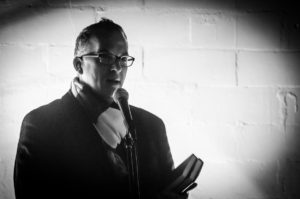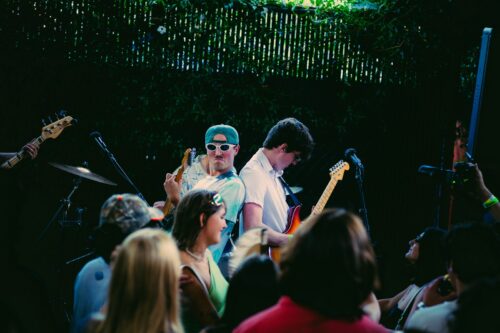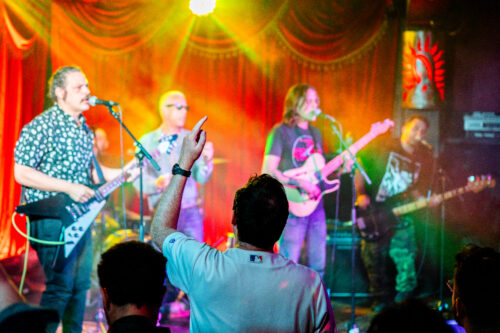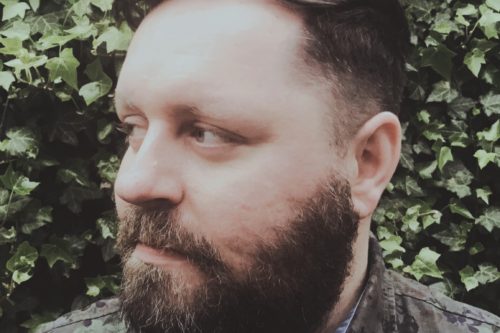 Angel City Review is proud to present the first installment of an interview series that will feature exclusive interviews with writers and musicians about the literature and music that moves them. First up we have Jim Ruland, author of the award winning novel Forest of Fortune and the short story collection, Big Lonesome. He recently co-authored Angeleno punk rock icon Keith Morris’ autobiography My Damage, and is the man behind the Vermin on the Mount reading series. We talked to him recently about his love for punk rock, Los Angeles, zines, and the future of VOTM.
Angel City Review is proud to present the first installment of an interview series that will feature exclusive interviews with writers and musicians about the literature and music that moves them. First up we have Jim Ruland, author of the award winning novel Forest of Fortune and the short story collection, Big Lonesome. He recently co-authored Angeleno punk rock icon Keith Morris’ autobiography My Damage, and is the man behind the Vermin on the Mount reading series. We talked to him recently about his love for punk rock, Los Angeles, zines, and the future of VOTM.
Angel City Review: What were your first encounters with punk rock and literature? Did your affinity towards both happen simultaneously or at different points in your formative years?
Jim Ruland: The worlds of punk rock and literature seemed very distinct to me and didn’t collide until I started getting involved in zines. A friend in grad school was a lifelong subscriber to Flipside, which was based in L.A. He wanted to move to L.A. and work for Flipside. I told him I thought this was a realistic ambition and put him in touch with my friends in North Hollywood where I’d lived for an exhilarating year after finishing my undergrad. He got the gig and soon I was writing reviews, interviewing bands, and penning my own column for Flipside. Writing for zines gave me access to the music I loved and I quickly figured out that I could do whatever I wanted to do. I was raised Catholic and had served in the Navy, so I was a rule follower by nature. Having the freedom to write in a space where there weren’t any rules was huge for me.
ACR: How much has punk rock informed your style as a writer?
JR: Punk zines are where I cut my teeth as a writer and learned how to write for an audience. There was a time when I wanted to be Kickboy Face but thankfully that was a short-lived phase I outgrew a long time ago.
ACR: Many people feel like music criticism (or criticism in general) is on the decline. What do you think the role of the music zine or blog will become in the next five years?
JR: Zines can be critical but they aren’t criticism. I wholeheartedly endorse the fanzine approach: embrace, document, and share the things you are passionate about. The world is full of weirdoes. Find your people.
ACR: First punk rock show?
JR: The Ramones at the Wax Museum in Washington, D.C. in 1985 (I think).
ACR: At what point did you realize that there were tangible ideological and aesthetic intersections between punk rock / DIY culture and the literary scene in LA and SD?
JR: When Flipside folded, two friends from grad school, Todd Taylor and Sean Carswell, started a new zine called Razorcake in 2001. They kept everything they liked about Flipside and got rid of the rest. We started doing readings around L.A. and found that if we asked people if we could read at their café or record store the answer was usually yes. I had this ongoing series of stories about a punk rock band that was perpetually on tour told in the style of a medieval manuscript. So I went around dressed like a monk’s robe with studded leather Birkenstocks reading these weird hyper stylized stories. In 2002 I set up an event at Track 16 in Santa Monica to celebrate the 25th anniversary of the Damned playing for the first time in L.A., and Keith Morris and Brendan Mullen read. We were even invited to open for X at the Knitting Factory. It was all very strange. Todd asked me to set up a reading for the Chicago writer Joe Meno, who was a columnist for Punk Planet at the time, and I thought it would be cool to expand the audience beyond the two or three dozen L.A. punk rockers who were amused by what we were doing and Vermin on the Mount was born.
ACR: Much of the literary canon from Los Angeles is often painted with a sense of dread and vaguely apocalyptic themes. Nathanael West and Joan Didion’s essays come to mind. Did the LA punk scene capture that same mood for you?
JR: Yes and no. I don’t think the early L.A. punk rock scene (or punk rock in general) was particularly literary, but it inspired some great narrative art that is full of dread.
ACR: How important is it for VOTM to be a place on the periphery of the culture where writers can read, share, collaborate?
JR: I think it used to feel more subversive when Vermin was held in a bar in Chinatown and I had not yet addressed my substance abuse issues, but I remain committed to Vermin being a space for indie and emerging writers. I’m not against mainstream writers (whatever that means) but if I have to deal with a publicist to book a writer for a show I’m probably not going to be interested.
ACR: How did the collaboration with Keith Morris on My Damage come together?
JR: Everyone asks about that and it’s not particularly interesting. My agent heard about the opportunity and introduced me to the publisher, which is not the way things usually work, but is still not a very good story. Keith has been amazing to work with. The guy has so much integrity. When he commits to something, he commits 100%.
ACR: So many rock “tell all” biographies tend to fall into the realm of sentimentality and cliche stories of debauchery and eventual cleanse and rebirth. In working with Keith on the book, how up front were you guys about avoiding the pitfalls of the rock bio?
JR: That’s a good question. I think there were some things we didn’t want to do—like we didn’t want to start the book with 75 pages of childhood memories—but I don’t know if we talked about how to avoid the pitfalls of the redemption trajectory. I knew that Keith’s stories would attract a lot of people who aren’t necessarily readers. So we hit on the idea fairly early to write short chapters—like a hardcore song—to keep the reader engaged and turning pages. But one of the myths of the redemption trajectory as it pertains to sobriety is that your life will get better after you get clean. Newsflash: it doesn’t. For many people, things get worse when they stop drinking and/or drugging because now they have to deal with the damage. I think Keith falls into that category. The glory years of punk rock were behind him when he quit and there were some hard years before he started to enjoy success with his band OFF!
ACR: Best place to eat a taco and catch a reading in SD?
JR: Salud in Barrio Logan has the best tacos in San Diego. On the last Thursday of every month So Say We All puts on VAMP at the Whistle Stop Bar in South Park but you better show up early if you want a seat because every show is standing room only.
ACR: Your favorite LA writer of the last 20 years?
JR: Chiwan Choi.
ACR: Favorite LA punk record?
JR: That’s a tough one but my go-to is The Adolescents self-titled debut, aka The Blue Album.
ACR: With nearly every corner of LA becoming more and more affluent these days, does that, in your opinion, affect the music scene in a negative or positive way?
JR: Punk rock has always thrived in the margins. It’s always been informed by class and power. Always, always. When Hollywood was the locus of the L.A. punk scene it wasn’t the Hollywood of stars and starlets but the Hollywood of teen hustlers and junkies. It’s ground zero, The Masque, was a bunker under a porn theater that Brendan Mullen converted into a practice and performance space. Glamorous it wasn’t. But even then you had punk in East L.A. Punk in the beach cities. Punk in the valley. Punk in Oxnard. So it’s a little disingenuous to talk about L.A. as a “scene,” which suggests some degree of homogeneity. It’s just too massive.
ACR: What are you currently working on?
JR: A novel set in near-future L.A. about a woman who works for an underground organization who breaks people out of prison hospitals.
ACR: What does the future hold for Vermin on the Mount?
JR: I’m always looking for ways for Vermin to be a more meaningful experience for its participants. I’m presently experimenting with podcasts and planning something in the category of an anthology. I recently came to the conclusion that I was holding Vermin back by doing everything myself. I’ve basically been re-inventing the wheel with every show, which is dumb because even with the 13th year anniversary coming up I have no intention of quitting or slowing down. I recently posted a solicitation for volunteers and asked for help. I’m not interested in “taking it to the next level” in the sense where Vermin on the Mount becomes a thing that burns up the time and energy of everyone involved – like so many magazines and websites do. I just want it to continue. If anyone reading this is interested in getting involved in an irreverent, irregular reading series with a punk rock aesthetic, drop me a line.
//
Follow Jim on Twitter: @JimVermin



